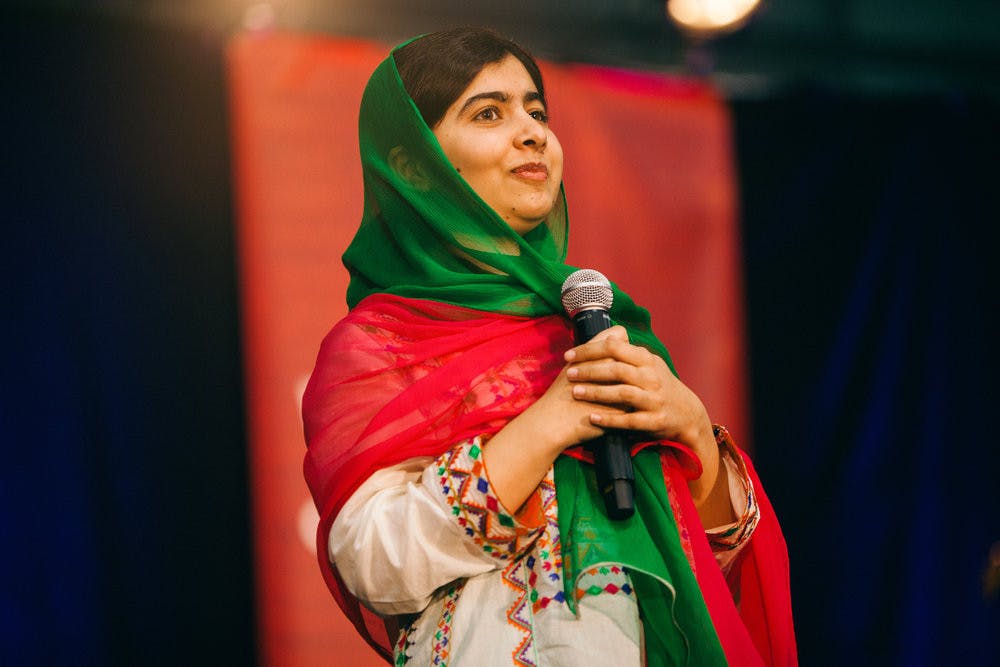BY: AYA ELAMROUSSI

Meriam Salem / Photo Collective
Iqraa, "to read," is the first word of The Holy Quran, the religious text of Islam. The book begins with that instructive word because knowledge is central to Islamic beliefs. It is a way of life. Education is not to be compromised as Islam teaches that humans are created to be Allah's successors on Earth with a mission to do good, to progress and to innovate.
As a Muslim woman, Malala Yousafzai, 20, not only believes this, but leads an entire movement based on these ideals.
"I knew that through education, I can achieve to be myself. To be a woman. To be a leader. To stand on my own two feet. To be independent," Yousafzai said Monday night at American University after she accepted the 2017 Wonk of the Year award.
She paced across the stage in a vibrant pink and green salwar kameez and continued. "That's why I started speaking out for myself."
Yousafzai was born in Mingora, Pakistan, and grew up in Swat, a valley in northwest Pakistan. In 2007, the Taliban, a group of fundamentalist Sunni Muslim militants, took control of Swat.
"They ban many things — like owning a television and playing music — and enforce harsh punishments, including public executions, for citizens who defy their orders, " according to The Malala Fund, the girls' education foundation Yousafzai founded in 2013.
In 2008, the Taliban banned girls from going to school. Women's education was one of the primary institutions the Taliban targeted.
"Women in a sexist society are usually told just to be wives, just to be daughters, just to be mothers. And not given the opportunity to be themselves, to be human beings," Yousafzai said as she adjusted her pink and green sheer hijab to cover her dark, silky hair.

Meriam Salem / Photo Collective
Yousafzai said that when her education was banned, so were her dreams of becoming a doctor or a teacher. But even when other Muslims, like the Taliban, destroyed her home and displaced her family "in the name of God," her view of Islam didn't change.
"[The Taliban] are completely unaware of the true meaning of Islam. The word ‘Islam' basically means peace. That's its literal meaning," Yousafzai explained.
Yousafzai became the youngest Nobel Peace Prize recipient when she was 17-years-old. Now at the age of 20, she is the face of girls' education and women's rights globally.
"My mission is to ensure every girl all around the world complete 12 years of quality, safe and free education," she said.
Yousafzai campaigns around the world for this cause. "I try to make change in the policies," she said. She believes in a "top down" approach, meaning that it is the government's responsibility to ensure quality education for every girl.
Yousafzai speaks with world leaders to make sure that every country from Canada to Iraq prioritizes girls' education. The global activist said she believes that education forges a path of endless possibilities.
"Girls can do anything. Women can do anything. We just need to be given the opportunity."

Meriam Salem / Photo Collective
When circumstances are tough, Yousafzai advises young girls to believe in themselves. "You have to continue following your dreams," she said. "Don't underestimate your potential… You can change the world."
To young Muslim Americans facing today's political climate, Yousafzai says "unite."
"Islam to me is a religion of peace...of brotherhood, of humanity. Kindness. Tolerance. Forgiveness."
Yousafzai said that people who only learn about Muslims from the news should talk to their next-door Muslim neighbors. "We should talk to each other… and celebrate the diversity that we have."
As the 2017 WTY, Yousafzai brought much diversity to the recipient list.
Aside from being the youngest and shortest Wonk, Yousafzai was the first foreigner, Pakistani, Muslim and Pashtun recipient.


